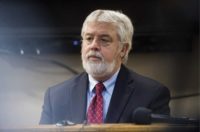Liability
Key Flint Negligence Lawsuit Witness Seeks to Drop Trial Role
H2M CEO found himself in awkward position after Veolia's acquisition of Suez

Richard Humann, CEO of H2M Architects + Engineers, has provided key testimony on engineering ethics and practice for Flint plaintiffs.
Photo Courtesy of H2M
The sole professional practice and engineering ethics witness that attorneys had planned to have testify against the consulting engineers in the 2015 Flint, Mich., water crisis negligence trial has said he no longer wishes to do so because of a conflict of interest that only became apparent in recent weeks.
The attorneys for the four children who are plaintiffs in the lawsuit have proposed substituting another engineering expert who has already provided his own report on the Flint engineers standard of care to take the place of Richard Humann, CEO of H2M Architects + Engineers.
Humann said in court documents that he has an ethical conflict created by one of the defendant engineering firms, Veolia North America, completing through its French parent company in March the acquisition of another France-based water services giant, Suez, which is a client of H2M. The deal was first announced in 2021.
The unexpected development complicates an already complex trial that has lasted two months and is scheduled for four.
In essence, the completed acquisition put Humann in the position of testifying against his client.
Suez Water Management Services and H2M entered into a master consulting services agreement in January 2021.
Humann said he initially believed the distinction between Suez and Veolia could be maintained despite the acquisition, and thought that a waiver of conflict by Veolia would suffice. But he recently learned that the Suez staff with whom H2M deals with had become Veolia employees after completion of the buyout deal.
"Upon reflection over the weekend," he said in a court affidavit filed April 19, "and after consulting with other engineers and H2M's counsel, it is clear that I cannot testify in this matter." Since his opinions about the other defendant engineering firm, Lockwood Andrews & Newnam (LAN), overlap with those on Veolia, Human said in the affidavit that he could not testify about either company.
The plaintiffs' attorneys proposed the substitution April 19 to Judge Judith Levy, who is presiding over the trial before a 10-member jury in federal court in Ann Arbor.
The unexpected development further complicates an already complex trial that has lasted two months and is scheduled for four.
Attorneys for Veolia and LAN are seeking to block the substitution for Humann. In a motion, Veolia's attorney said Humann knew of the issue and has no actual conflict of interest. In another motion, LAN's attorney claimed the substitute expert's opinion differed in significant ways from Humann's and that, as a solution, the H2M CEO's videotaped deposition should be played for the jurors in court.
The jury had not yet heard from Humann, a potentially damaging witness. He had provided deposition testimony accusing the two engineering companies of violating professional engineering ethics and the standard of care, especially “for firms of their caliber and reputation.” Both firms had opportunity and an obligation to blow the warning whistle and try to prevent the lead pipe contamination or more quickly end it, Humann testified in his deposition.
The deposition given by the witness remains sealed, but elements of it had spilled into view in an affidavit and in rulings by Levy. Such expert witness testimony is often key in negligence trials
While expert witnesses frequently rely mainly on technical expertise and academic credentials for credibility, Humann, a licensed engineer, was potentially more formidable because he also leads Melville, N.Y.-based H2M. It performs water-related work and writes insurance-related reports among its services and has 11 offices and about 400 staff members. The firm is listed on ENR's 2021 Top 200 Environmental Firms ranking.
The defendants, Flint municipal consultants Veolia North America and Lockwood, Andrews & Newnam, have fought to prevent the plaintiff's from substituting new new standard-of-care and ethics witness to take Humann's place in testimony before the jury.
Before the jury trial started, the defendants had fought to keep parts of Humann’s pre-trial testimony from being used, based on his qualification to provide an informed opinion on some matters. Now the defendants' counsel are eager for him testify or at least prevent a substitute from going before the jurors.
Flint hired LAN in 2013 for water treatment plant engineering related to a plan to switch its water source to the Flint River from Lake Huron via the Detroit Water and Sewage Dept. Court documents say LAN recommended a lime and ash softening solution for river water corrosiveness.
Humann has stated that both defendant firms had enough knowledge of potential lead problems in Flint’s water supply—during planning by city and state officials to switch the water sources, or from the water quality after the switch—to warrant public warnings.
Both firms should have alerted “professional bodies” and “public authorities,” Humann wrote regarding the danger.
Humann said the plan would have been insufficient, and that it is fundamental engineering that “a public water supply” using surface water in a city known to have lead pipes produces lead leaching into the water. Humann stated in a report for the trial that LAN should have known in 2013 that there was a “clear lack of time to get [the Flint Water Treatment Plant] operational by April 2014,” including time needed to order components and make electrical changes.
Humann has also argued that Veolia, hired by Flint as the crisis unfolded, had been seeking a consulting relationship with the Detroit water-sewer agency, which had just lost Flint as a client for its Lake Huron water. Veolia would have learned much about Flint’s water system in seeking that work, and once the switch was made to the Flint River, just the color and odor of the water should have set off corrosion and lead alarms, Humann said.
Testimony Harmful to Veolia
Other recent testimony has cast Veolia in a bad light. At a 2015 meeting with Flint residents worried about discolored and odorous tap water, a Veolia employee reassured them that the water was safe and met drinking water standards. But days earlier, two firm staffers exchanged emails that noted the possibility of lead contamination and did not communicate those concerns to former Flint Mayor Dayne Walling, he testified at the trial on March 30.
Both firms said government officials, including several who face criminal charges, were to blame for what occurred. Veolia emphasizes that its services began during the crisis and only lasted a month. LAN officials testified that it was unaware that city drinking water contained lead, which is why they did not provide warnings, and that the firm could not have been responsible for recommending orthophosphates to prevent corrosion because it was not hired for corrosion control services.
When LAN’s chief engineer learned that Flint was not using enough corrosion control, he cursed to a city employee but was shut out and could do no more, according to his testimony.
Speaking about ethics in general unrelated to the trial and its controversies, Rebecca A. Bowman, National Society of Professional Engineers senior director for ethics, says the group maintains that public health and safety is the paramount concern of every engineer “and fulfilling that obligation can take great moral courage.”
Failures “where public safety is harmed or endangered,” she adds, will become “case studies for the future.”
This story was extensively updated April 28 to reflect Richard Humann's decision to drop his trial role and the defendants' opposition to the plaintiffs' proposed substitute witness.






